Optimising location filters for candidate curation
I was responsible for end-to-end design in a mission to help ops team members work more efficiently.
Context
OfferZen provides companies with a curated marketplace where they can find quality software developers. After onboarding candidate profiles go through a manual curation process. As OfferZen expanded into new supply markets, curation tooling needed to be updated to enable Marketplace Specialists to curate more efficiently.
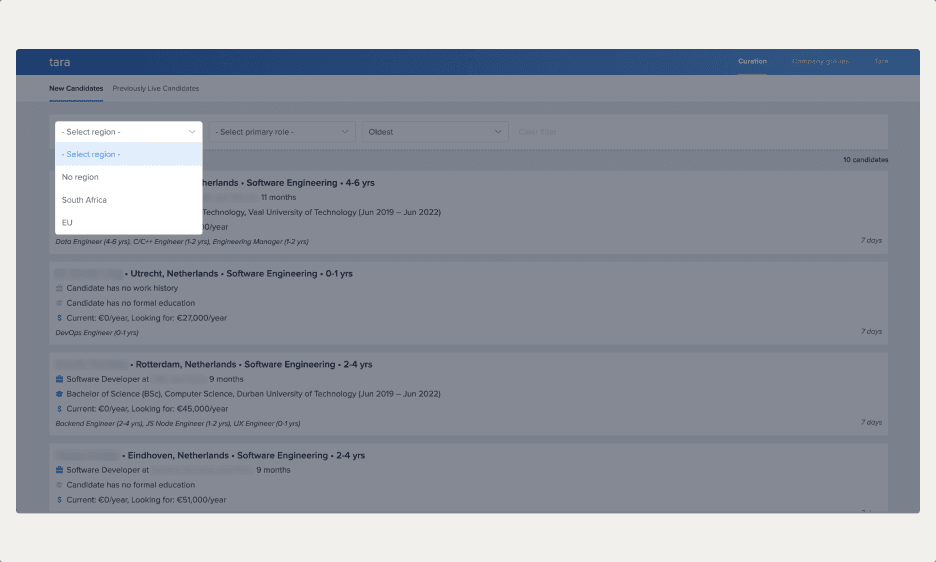
The location filter highlighted in the curation tool
Problem
A critical function of the curation tool is to filter candidates by location. The filter didn't serve Marketplace Specialists well anymore and in the rapidly expanding marketplace they were at risk of being overwhelmed. I invited the Product Manager and Engineering Manager on my team along to chat with Dina and Reece, our Marketplace Specialists. Here is what we found:
Some candidates from unsupported locations need to be rejected manually
Although there are auto-reject rules in place, they aren't foolproof. The result is some pain in the curation process.
Current location filters don't support new location based curation heuristics
European candidates are all grouped together in the EU bucket. Candidates from different European countries require different curation heuristics.
Candidates are sometimes sent to the wrong location "bucket"
Some UK candidates are landing in the “No region” bucket, causing friction in the curation process.
Technical requirements
The old region polygon data model is being replaced with a new comprehensive location data model. All components in the product that use location data need to be updated to accommodate the new model.
Gaps in the region polygon is what was causing some UK candidates to be sent to the “No region” bucket.

The location filter highlighted in the curation tool
Business needs
OfferZen wants to provide candidates with a zen job search experience. Quick and efficient curation enables the business to deliver this brand promise.
Candidates on OfferZen are released in batches. If candidates aren’t curated on time they are at risk of missing the batch which degrades their experience and increases the likelihood that they’ll focus their job search efforts outside of OfferZen.
Goal
Enable more efficient candidate curation and prepare the location filter to use a new comprehensive location data model.
Success metrics
Current efficiency is maintained: all candidates in the curation tool are curated before 12PM every day.
Marketplace Specialists are able to reach a flow state while curating.
User research
Dina and Reece are curation experts. Collaborating with them in the design process was vital to creating location filters that would meet their needs.
Card sorting exercise
I asked Dina and Reece to arrange countries they would curate together in groups. To support faster sorting, sticky notes were colour coded according to the primary regions as generally defined at OfferZen.
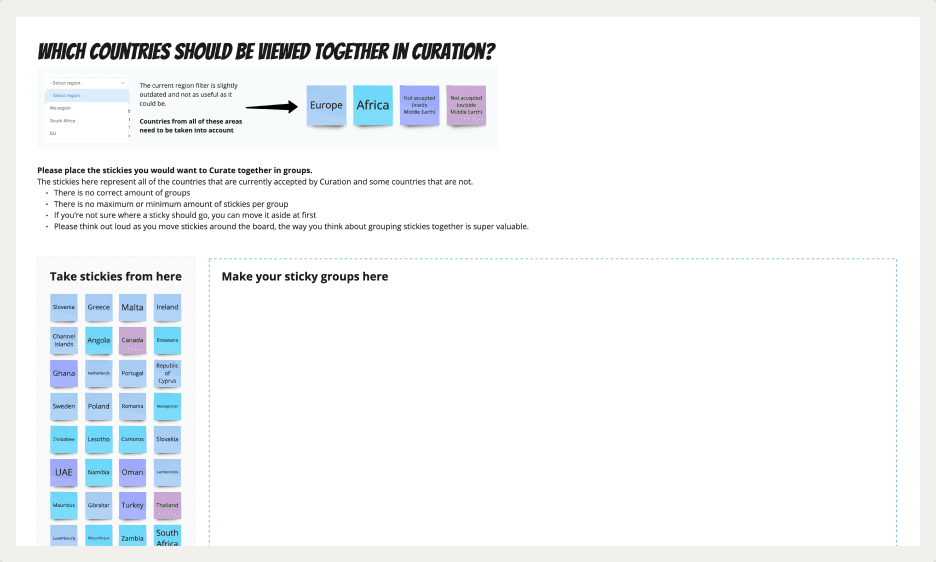
The card sorting exercise Miro board
Findings
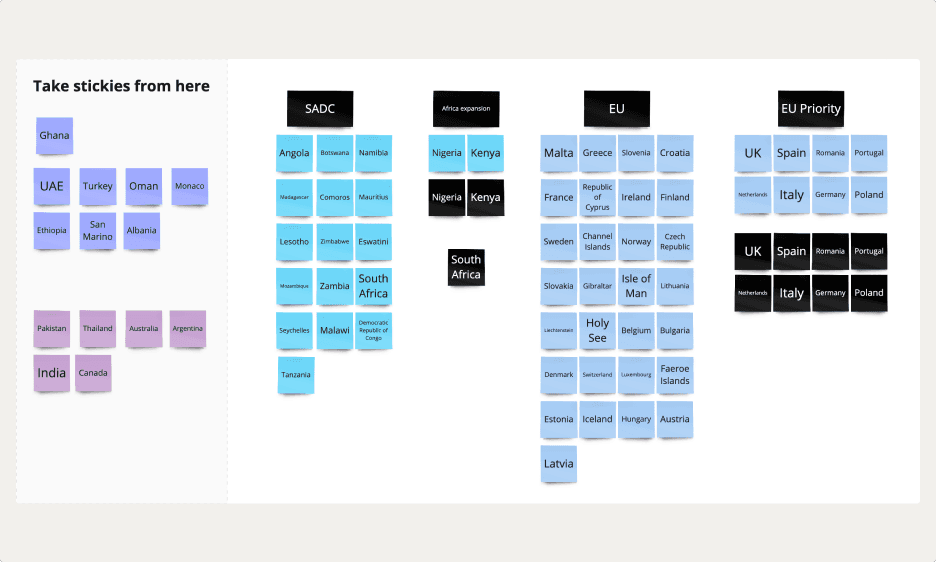
The completed card sorting exercise
Wireframes
The insights I gathered in the card sorting exercise allowed me to iterate on wireframes quickly. I selected the version that would best meet their needs for testing.

Version 1
✅ Dina and Reece would be able to filter countries by group or select individual countries to experiment with heuristics.
❌ Including all experimental countries as individual options adds a lot of noise.
Consider: Dina and Reece need to select experimental countries individually sometimes, but it would not be their primary workflow.
❌ Technical limitation: OfferZen uses a custom component library and at this time it did not include a searchable multi-select dropdown component.
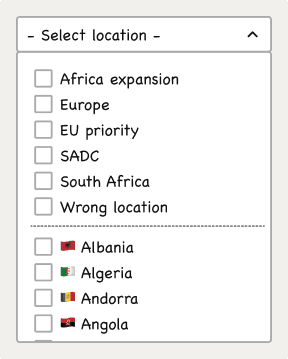
Version 2
✅ The filters Dina and Reece need most often are separated visually so that they are easy to find and select.
✅ All countries in “Middle Earth” are available to select below the divider line, enabling quick experimentation with little dependency on Product.
✅ Unsupported locations are included as a group to catch candidates that fall through the cracks in the auto-reject rules.
✅ The majority of candidates in curation are based in the South Africa. Keeping it as an individual option would ease distribution of work between Dina and Reece.
User testing
I created a prototype of my suggested filter configuration and tested it with Dina and Reece in separate online sessions.
Assumptions
Displaying primary filter groups above the divider line will reduce noise. Dina and Reece should find the groups they need easily.
Dina and Reece will understand that individual countries below the diver line can be selected in combination with country groups.
Trying to search for a country in a list will be a natural response when opening the filter.
Figma prototype created for user testing
Findings
Solution
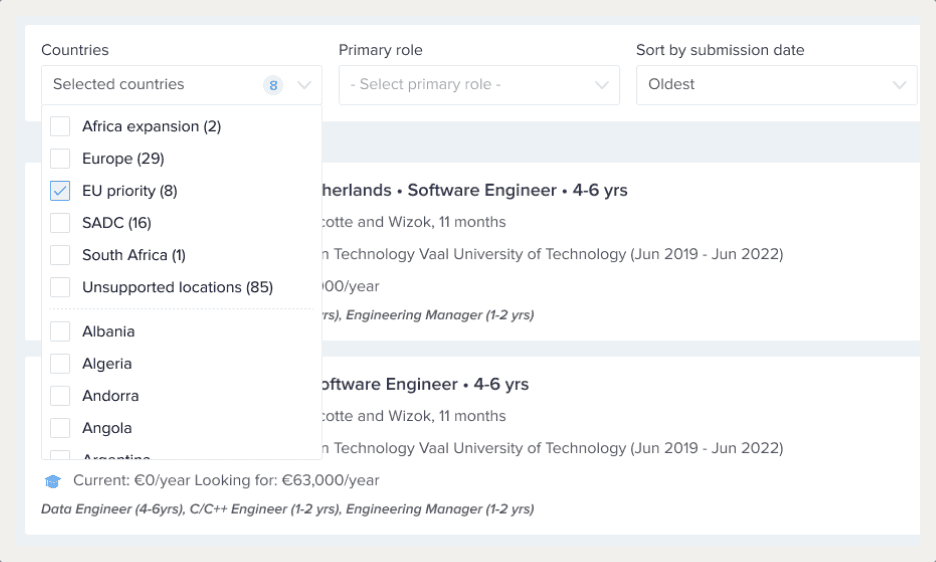
The final location filter
Results
Future improvements
What I learned
The best way to create a valuable, effective solution is to include your users in the discovery and design process. Dina and Reece are the experts in their domain, by collaborating with them I was able to design a solution that truly met their needs.